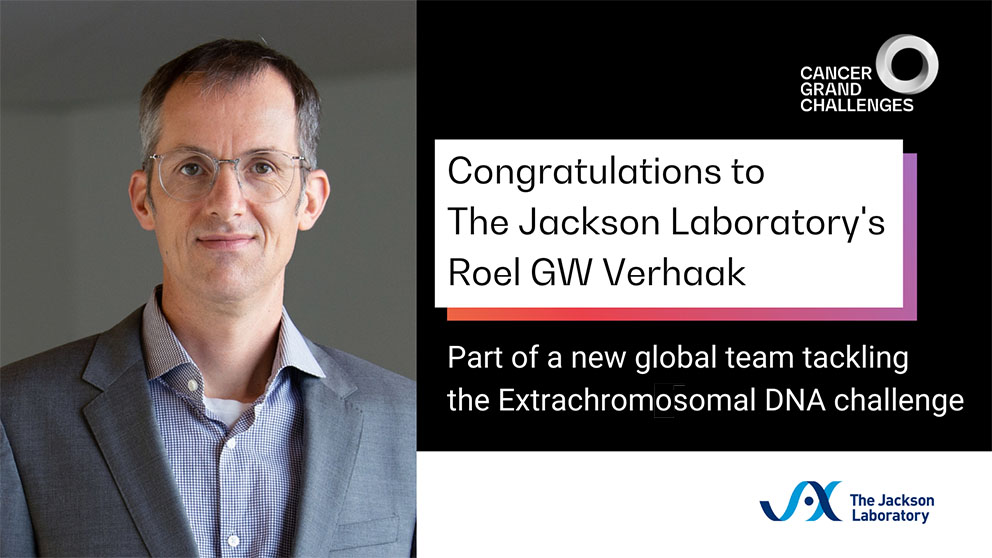
The team, which is led by Paul Mischel, M.D., Stanford Medicine, and includes co-investigators from 11 institutions across the U.K., U.S. and Germany, will receive $25M to take on the challenge of extrachromosomal DNA, a major driver of tumor evolution present in around a third of cancers.
The team is one of four new teams announced this week as part of Cancer Grand Challenges, selected from 169 applications, and representing a total investment of $100M to diverse, global teams to take on some of the toughest challenges in cancer research.
A world-class team of researchers, including The Jackson Laboratory’s Roel Verhaak, Ph.D., has been selected to receive a $25M Cancer Grand Challenges award to tackle the challenge of extrachromosomal DNA (ecDNA), a major driver of tumor evolution in people with cancer. Cancer Grand Challenges is a global funding platform, co-founded by Cancer Research UK and the National Cancer Institute in the U.S., that supports a community of research teams to come together, think differently and take on some of cancer’s toughest challenges.
The Cancer Grand Challenges eDyNAmiC team will tackle the challenge of ecDNA – small, circular pieces of genetic information that enable cancer cells to rapidly evolve to become resistant to treatment. Present in approximately one-third of cancers, ecDNA promotes aggressive tumor behavior and leads to poorer outcomes for patients – discoveries made by Verhaak.
"Extrachromosomal DNA amplifications play a major role in direction clonal selection and consequently, intratumoral heterogeneity, tumor evolution, and response to therapy. I am hopeful that we will be able to make progress in developing better treatments for brain cancer by targeting extrachromosomal DNA,” said Verhaak. “Our team consists of truly outstanding scientists with diverse backgrounds - some team members do not even study cancer – and this cross-fertilization across disciplines has us poised to make critical new discoveries.”
The team hopes to unlock a deeper understanding of ecDNA, which could ultimately lead to new therapies for people with some of the hardest-to-treat cancers.
“Cancer is a global issue that needs to be met with global collaboration. This investment in team science encourages diverse thinking to problems that have long hindered research progress,” said David Scott, Ph.D., director, Cancer Grand Challenges, Cancer Research UK. “Cancer Grand Challenges provides the multidisciplinary teams the time, space and funding to foster innovation and a transformative approach. The eDyNAmiC team is one of four newly funded teams joining a scientific community addressing unmet clinical needs across cancer research.”
More information:
Founded by the two largest funders of cancer research in the world – Cancer Research UK and the National Cancer Institute, part of the National Institutes of Health in the U.S. – Cancer Grand Challenges aims to make the progress against cancer we urgently need. Cancer Grand Challenges currently supports more than 700 researchers and advocates across 10 countries, representing 11 teams are supported to take on 10 of the toughest challenges in cancer research. On 16 June, 4 new teams were announced.
The Cancer Grand Challenges eDyNAmiC team is spread across 11 institutions across the US, UK and Germany: Stanford Medicine; University of California, San Diego; New York University Langone Health; University of Texas Southwestern Medical Center; Scripps Research Institut; Queen Mary University London; University College London; Max Delbrück Center for Molecular Medicine and Charité Berlin; Fred Hutchinson Cancer Research Center; University of Cambridge; Jackson Laboratory for Genomic Medicine. The Cancer Grand Challenges eDyNAmiC team is funded by Cancer Research UK and the National Cancer Institute in the US.